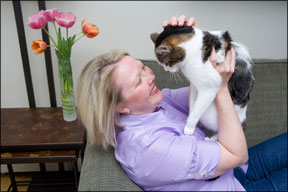Many of us have spent considerable time planning for the care of our family members in the event that we die or become incapacitated. Unfortunately, though, we often fail to consider the needs of our smallest 288 family members: our pets. In the past, most pet owners didnt think about making formal arrangements for their cats in their wills. But all thats changing, according to David Congalton, co-author of When Your Pet Outlives You: Protecting Animal Companions After You Die. “Historically, the problem has been lack of awareness, but thats all changed in the last decade,” Congalton says. “Most states now allow pet trusts, and the attitude towards protecting animals has completely changed in courts and legal circles.” Lets face it: None of us knows when were going to die, and most of us assume that we will outlive our cats. Sadly, thats not always the case; a car accident or sudden illness might claim your life tomorrow. Thats why it is vitally important to make arrangements now for the care of your pets, before you die or become incapacitated through injury or illness. These tips will help: Short-term Care. First, ask at least two responsible friends or family members to be temporary caregivers for your cat if something unexpected should happen to you. (Lining up more than one person gives you added security that at least one of them will be available to take care of your cat in an emergency.) Give each person a key to your home as well as feeding and care instructions, the name and telephone number of your veterinarian and information about permanent care provisions you have made for your cat. Ideally, the short-term caregivers will already be familiar with your cat and any other animals in your household and should know how to contact one another. As an added precaution, carry a card in your wallet that lists the names and phone numbers of your pet caregivers, so that emergency personnel will be able to contact them if youre unable to return home. Long-term Care. Next, consider whom you would like to have care for your cat long-term. This might be your temporary caregiver or someone else. In most cases, a spouse, parent, adult child or close friend who knows and loves your cat will be the ideal choice. But if you dont have any family or friends willing to accept permanent guardianship of your cat, you might consider bequeathing her to a pet sanctuary or veterinary school pet center. The cost and level of care varies from center to center, so its important to conduct a thorough investigation of the facility youre interested in before enrolling your cat. Once you have chosen temporary and permanent caregivers, sit down and discuss your wishes with them. Be sure they are aware of your cats needs, such as a special diet or any health issues. If you have more than one cat or other pets in your household that have a close bond, try to make arrangements so they can stay together. Having a buddy will likely help make the transition a little easier for your cat. Making a Will. Now that you have selected your cats caregivers, its time to make it official. Consult an estate planning attorney who can prepare the necessary documents that give specific instructions for the care and ownership of your feline friend. If you dont have a lawyer, ask your friends or family members for a recommendation or consult the American Bar Association (www.abanet.org) for assistance in finding an attorney in your area. Although its not necessary, many people set aside a sum of money to leave to the caregiver to pay for ongoing expenses such as food and routine veterinary care. Preparing a will that includes arrangements for your cat is vital, but many owners resist taking this important step. “People dont want to think about what will happen if they die,” says Christine Bellezza, DVM, a consultant with the Feline Health Center at Cornell Universitys College of Veterinary Medicine. “Its a tough subject.” Failure to plan ahead can have disastrous results. Oftentimes cats left behind when an owner dies end up being surrendered to an animal shelter where they may be euthanized, especially if theyre older or have health problems. “These animals go from being beloved family members to living all alone in a cage at a shelter,” says Dr. Bellezza. “Its heartbreaking.” Congalton reminds us of the importance of planning ahead for our cats future. “We need to get past the thinking stage and actually take action before its too late,” he says. “Unfortunately, this is one of those items that pet owners mean to do, but put off for one silly reason or another. Dont delay. Do it!”



